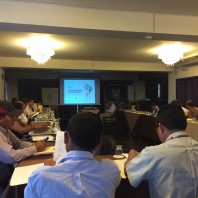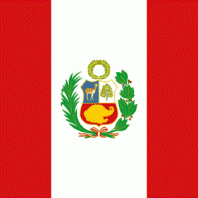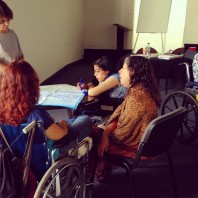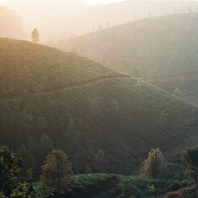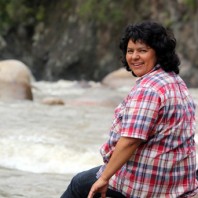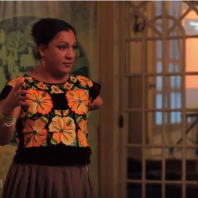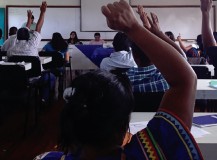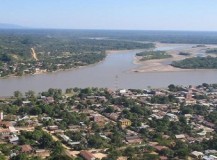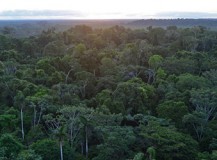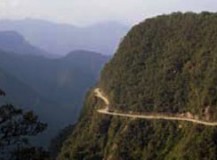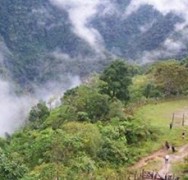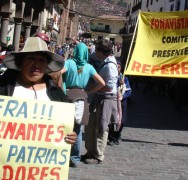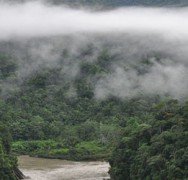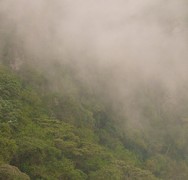This post is also available in: Spanish A Forest of Money? – PDF Today, BIC is publishing a translation of an important study on international finance for forests in Peru, titled “Un Bosque de Dinero” or “A Forest of Money” in English, which was written in collaboration with Derecho, Ambiente y Recursos Naturales (DAR). This …
This post is also available in: Spanish

The Bank Information Center’s (BIC’s) Latin America Program focuses on documentation and analysis of international financial institution (IFI) projects and policies; fostering dialogue between and among local communities, civil society organizations (CSOs), and decision makers; and capacity building around the institutional mechanisms and policies for public consultations, the monitoring of projects, and overall public engagement with the IFIs.
Since 1992, BIC has worked with communities affected by the policies and projects of multilateral development banks in Latin America. Along with the World Bank and several other institutions, the Inter-American Development Bank (IDB) has long been a focus of the Bank Information Center’s monitoring activities.
As a public multilateral bank, the IDB is a key political interlocutor in strategies and negotiations concerning development in Latin America. Nevertheless, the IDB’s social and environmental policies and mechanisms for public consultation and inspection—fundamental instruments to establish financial norms in the region—are still below international standards. Currently, with the rush for banks to finance a new wave of mega-infrastructure projects, many sectors within the IFIs and governments view these standards as obstacles to development. They try to weaken them just when it would be best to harmonize upward these same standards within all the international financial institutions (IFIs).
Political climate in Latin America
During the 1980s and into the 1990s, many countries in Latin America adopted most of the policies associated with the “Washington Consensus,” including structural adjustment, privatization, and market and trade liberalization. The rising poverty rates in these countries over the past twenty years—despite their adoption of policies which the MDBs (among others) promoted as essential to economic growth, stability, and poverty alleviation—are a living testimony to the failure of these policies.
Thus, barely a decade after the Washington Consensus was instituted as the sure path to growth, ideas about a new Latin American development model, dubbed the “post-Washington Consensus” by some economists, began to circulate. The new model was based on greater attention to equity, improved service delivery to the poor, and the consolidation of democratic institutions and it caught on with Latin American voters sooner than it did with the region’s traditional political class or with their backers in the MDBs.
Partly on the strength of their questioning of neoliberal adjustment policies, a new generation of political leaders have been elected in Venezuela, Brazil, Argentina, Uruguay, and, most recently, Bolivia and Chile, raising hopes of more effective approaches to poverty alleviation among Latin America’s poor and forcing the IFIs to reevaluate their stance toward the region.
As the debate over the best policies and strategies to adopt for sustainable development in Latin America continues, the following remain among the most pressing issues affecting the region:
- Persisting lack of confidence by various sectors of the public in “democracy” and government;
- Persisting poverty, with high levels of inequality according to differences in race/ethnicity and gender;
- Inadequate or non-existent social services, including those related to health and education;
- High levels of violence and physical insecurity;
- Privatization of public utilities and public goods, such as water;
- Government concessions, awarded through non-transparent processes, for companies to explore and exploit natural resources in indigenous-majority areas;
- Incomplete decentralization processes that pass along decision making responsibility without a corresponding transfer of revenues from federal to state and municipal level governments; and
- Large debt burdens.
This post is also available in: SpanishBIC Rebuttal to the World Bank’s Response to BIC’s case studies on Development Policy Operations in Peru, Egypt, Mozambique, and Indonesia March 2017 In January 2017, the Bank Information Center (BIC) along with international and local partner organizations published a report and four case studies on seven World Bank …
This post is also available in: SpanishLima, Peru. January 24, 2017 Summary On January 24th, 2017, Bank Information Center, Derechos Ambiente y Recursos Naturales (DAR) and AIDESEP (Interethnic Association of the Peruvian Amazon) presented a workshop titled “Reformas Globales y Alcances Nacionales” to an audience of approximately 50 participants from Peruvian civil society, including representatives …
Update: World Bank Should Release Draft of Country Partnership Framework for Meaningful Consultation
This post is also available in: Spanish January 11, 2017 The World Bank is in the process of drafting a new Country Partnership Framework to guide its work in Peru for the next four to six years. This framework is slated to be finalized by April 2017, and is meant to include feedback and comments …
This post is also available in: SpanishThe World Bank Group is in the process of drafting a Country Partnership Framework (CPF) in Peru, to be finalized in early 2017. There are three upcoming consultations in Peru on the Country Partnership Framework. They will be held in: Trujillo – October 19th Lima – October 27th Cusco …
This post is also available in: SpanishTraining with the disability community to prepare for the safeguard consultation in Lima, Peru February 2015 We have been advocating to ensure that persons with disabilities are included and taken into consideration throughout all stages of the project cycle—from design, to implementation, to monitoring—since the beginning of the safeguard …
This post is also available in: SpanishBIC, along with in-country partners, has published three new case studies on the impacts of several World Bank projects on forests and forest communities. You can find them below: A Case Study of the World Bank’s Land Allocation for Social and Economic Development Project in Cambodia The World Bank …
This post is also available in: SpanishIn the weeks following the murder of Berta Cáceres, leader of the Civic Council of Popular and Indigenous Organisations of Honduras (Copinh) and leader of the resistance against the Agua Zarca hydroelectric dam on the Gualcarque river, there has been international outcry for justice for Berta and security for …
This post is also available in: Spanish BIC organized a delegation of 9 Latin American SOGIE activists to participate during World Bank Annual Meetings. The delegates met key decision makers both inside and outside of the institution, participated as expert panelist at events during the WB Policy Forum, and a Civil Society Organizations Alternative Event. …
This post is also available in: SpanishEnvironmental and indigenous rights organizations all over the world reacted with shock and concern over the recent killing of Berta Cáceres, indigenous activist and head of COPINH, the Civic Council of Popular Indigenous Organisations of Honduras. BIC, along with over 50 other organizations, has signed an open letter …
- As a forerunner in the REDD+ preparation process and the first country accepted into the Forest Carbon Partnership Facility's Carbon Fund, Costa Rica has the potential to set important precedents and serve as an example for other countries pursing REDD+.
- The road project between Ixiamas and San Buenaventura represents the most concrete opportunity for the northern region of La Paz to bring environmental considerations into regional planning from the very first stages of the process.
- Difficulty in mitigating and managing forest ecosystem impacts from major infrastructure investments, such as the Southern Highway, have called attention to the lack of adequate planning in the Peruvian Amazon.
- This post is also available in: Spanish For more information please contact Latin America program director Christian Velasquez-Donaldson or view the details in Spanish.


